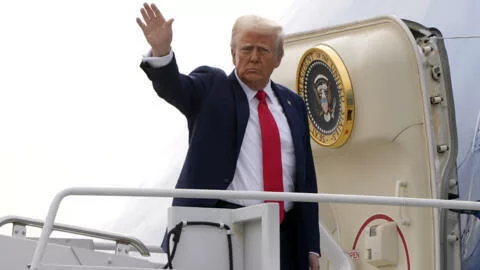
On January 20, 2025, Donald Trump officially became the 47ᵉ President of the United States after taking over from Joe Biden. His return to the White House marks a radical shift in American politics, with direct repercussions for economic relations between the United States and Canada. Since his inauguration, Trump has implemented his economic priorities, including a return to protectionism, threats of tariffs, and a redefinition of trade policy with his neighbors. In this article, we look at the evolution of economic relations between the two countries.
I - Trump remains true to his commitments
Upon his return to the White House, Donald Trump immediately implemented the commitments he made during his 2024 campaign. Among his priorities is border security, with the drive to deport millions of immigrants without legal status. This measure aims to strengthen migration control while sending a strong message to his electoral base about protecting national identity.
- An environmental and societal shift
Trump has also reaffirmed his position on environmental and social issues. On his first day in office, he made official the United States’ withdrawal from the Paris Climate Agreement, a decision that underscores his rejection of global climate commitments. Furthermore, he signed a controversial executive order on gender identities, recognizing only the two binary genders, a significant step backwards for the rights of 2SLGBTQ+ people.
- The presidential pardon and internal division
On the social and judicial front, Trump granted pardons to over 1,000 criminals involved in the January 6, 2021 assault on the Capitol. This decision provoked widespread unease, particularly among law enforcement officials and some Republicans. It revealed internal divisions over how to deal with the events of January 6 and the legitimacy of Trump’s actions vis-à-vis his political allies.
3. A trade agreement under pressure
On the economic front, Donald Trump has adopted a distinctly protectionist approach. He has announced the imposition of 25% tariffs on imports from Canada and Mexico as of February 1. This decision threatens to upset trade relations with these two strategic partners. A few days later, in a speech at the Davos Economic Forum, he stressed that the American economy “doesn’t need” Canada, reinforcing his talk of strengthening American economic independence.
Finally, in a new provocation, Trump revived the idea of integrating Canada as a 51ᵉ U.S. state. Although this idea is primarily symbolic, it is helping to fuel diplomatic tensions with Canada and calls into question the traditional balance of international relations.
These statements are part of a series of similar stances towards other nations, such as Panama and Greenland, and signal months of turbulence ahead on the world stage.
II - A trade agreement under pressure
Donald Trump’s recent statements about the Canada-U.S. relationship, accompanied by threats of tariffs, put Canada in a difficult position. The relationship between Canada and the U.S. is vital, and it’s clear that the U.S. needs Canadian supplies. Even though Canada is economically smaller, it remains an important partner for 35 U.S. states.
As for the tariffs, while they are likely to be implemented, they will not be implemented as quickly as Trump has suggested. In fact, the scope and timing of these measures remain unclear. It seems that these threats are more part of a negotiating strategy.
Trump seems to be paving the way for the renegotiation of the Canada-U.S.-Mexico Agreement (CUSTA), scheduled for 2026. The question of Canada’s contribution to NATO, still far from the 2% GDP target, could also be used as leverage in these negotiations.
Donald Trump’s return to the White House is deeply disrupting economic relations between the United States and Canada. With his protectionist approach and threats of trade tariffs, he is testing the strength of bilateral trade. However, these tensions also underscore Canada’s importance as a strategic partner for the American economy. Faced with these challenges, Canada must adapt to an uncertain environment while protecting its economic and diplomatic interests in an increasingly complex global context.
Subscribe to the TRANSFERGRATIS blog to stay informed of our updates.







